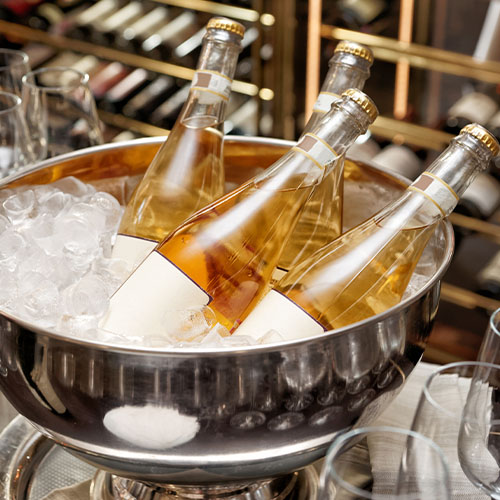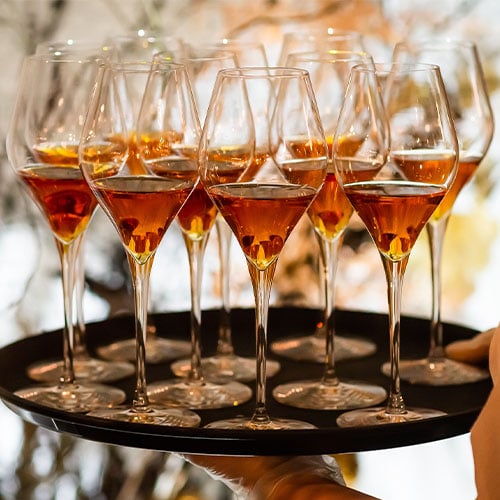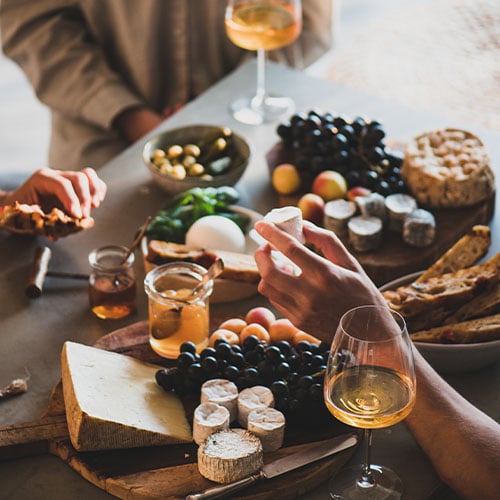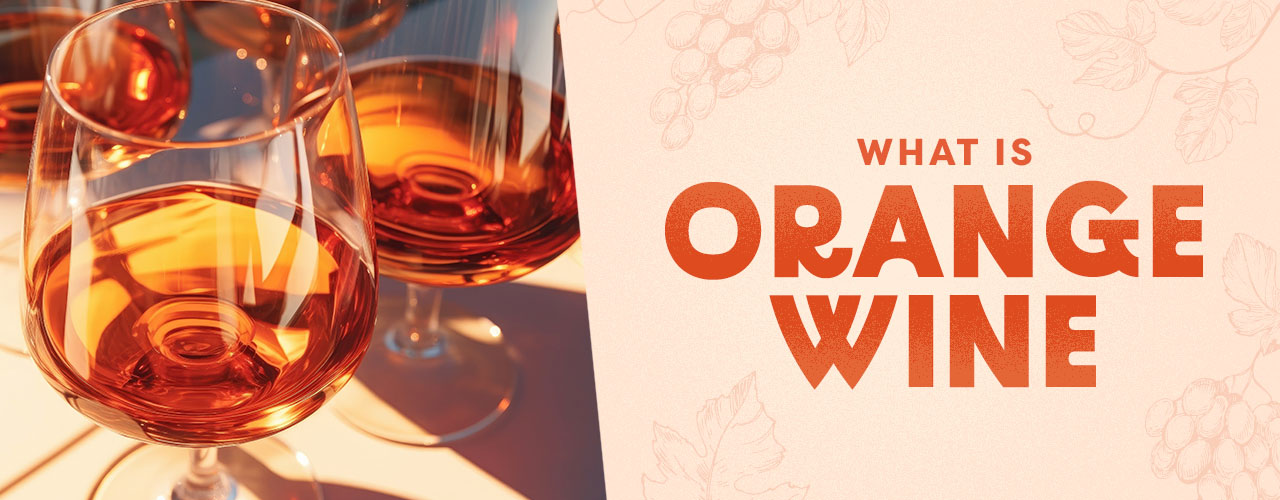One of the trendiest types of wines right now is orange wine, a wine that is not made from oranges, as the name might suggest. Instead, it gets its name from the color of the wine, which can range from a deep amber to a vibrant orange hue. Orange wine is made by allowing the grape juice to ferment on the skins for an extended period of time, as the prolonged contact with grape skins gives the wine its distinct color and flavor profile. These wines boast flavors of dried fruits, nuts, and spices, making them great additions to your establishment’s wine list.
Orange Wine Explained
Watch the video below for a quick visual overview of everything you need to know about orange wine:
How Is Orange Wine Made?
Orange wine is made from white wine grapes, but the process is quite different from making traditional white wine. After the grapes are harvested, they are gently crushed and left to macerate (soak with the skin, seeds, stems, and grape juices). This maceration process can last anywhere from a few days to several months, depending on the desired intensity of color and flavor. During this time, the grape skins release tannins, pigments, and aromatic compounds into the juice, resulting in a distinctive orange hue.
Once the maceration is complete, the juice is pressed off the skins and transferred to fermentation vessels, usually oak barrels or clay amphorae. Here, the juice undergoes fermentation, where natural yeasts on the grape skins convert the sugars into alcohol. This natural fermentation process is one of the key characteristics of orange wine, as it allows for the development of complex flavors and textures.
Orange Wine Taste

Orange wines tend to have a rich texture and a tannic structure similar to red wines, which adds depth and complexity to the overall taste. One of the most notable characteristics of orange wine is its pronounced acidity. This acidity gives the wine a refreshing and lively quality, while also helping to balance out the wine's fuller body and intense flavors.
Is Orange Wine Sweet or Dry?
One common misconception about orange wine is that it is sweet, similar to a dessert wine. While some orange wines can have a touch of sweetness, many are actually dry. The sweetness or dryness of orange wine depends on a variety of factors, including the grape variety, the fermentation process, and the winemaker's preferences.
Orange Wine vs White Wine
In terms of taste, orange wine often exhibits a more complex and robust flavor profile compared to white wine. Orange wines also tend to have more pronounced aromas and flavors, with notes of dried fruits, nuts, and even spices. This makes them a great choice for those who enjoy exploring unique and unconventional flavors in their wine.
Orange Wine vs Red Wine
While red wines are known for their bold and robust flavors, orange wines offer a more nuanced and complex taste profile. They often have a more pronounced acidity than red wines, which gives them a refreshing and zesty quality. This acidity can be complemented by flavors of citrus, dried fruits, and even tea-like notes.
Orange Wine ABV
On average, orange wines have an ABV ranging from 12% to 15%. This higher alcohol content is a result of the extended maceration process used during orange wine production. The skins contain natural sugars that are converted into alcohol during the fermentation process, resulting in a higher alcohol content compared to white wines.
Types of Orange Wine

Just like white and red wine, orange wine comes in a variety of styles, each with its own unique characteristics. Below, we’ve listed a few types of orange wine you’re most likely to come across:
- Skin-Contact Orange Wine - The most common type of orange wine is made by fermenting white grapes with their skins, just like red wine. The extended contact with the grape skins gives the wine its distinct orange color and tannic structure. Skin-contact wines can range from light and refreshing to full-bodied and complex.
- Amphora-Aged Orange Wine - Some orange wines are aged in clay amphorae, which are large, egg-shaped vessels. Amphora-aged orange wines often exhibit earthy and mineral notes, along with a silky mouthfeel.
- Barrel-Aged Orange Wine - Similar to red wine, additional complexity and flavoring can be added to orange wine by aging it in oak barrels. Barrel-aged orange wines may have hints of vanilla and spice, along with the characteristic orange wine flavors.
- Sparkling Orange Wine - Just like sparkling white wine, orange wine can undergo a secondary fermentation process to create bubbles. Sparkling orange wines are a fun and unique twist on traditional sparkling wines, offering a vibrant and effervescent drinking experience.
How to Serve Orange Wine
Serving orange wine is a unique experience that requires a bit of knowledge to fully appreciate its flavors and characteristics. We've outlined some of the most important factors to keep in mind when serving orange wine, allowing for the best experience possible:
- Temperature - Like any other wine, the temperature at which you serve orange wine can greatly affect its taste. Generally, orange wine is best served slightly chilled, around 55-60 degrees Fahrenheit. This temperature allows the flavors and aromas to fully develop without being overwhelmed by the chill.
- Decanting - Orange wine is known for its complexity and depth of flavors. To fully appreciate these characteristics, it’s recommended to decant orange wine before serving. Decanting wine allows it to come into contact with oxygen, which helps to open up the flavors and aromas.
- Serving Size - Orange wine is typically enjoyed in smaller servings compared to traditional white or red wines. A standard serving size for orange wine is around 3-4 ounces, allowing you to savor the unique characteristics without overwhelming your palate.
Orange Wine Glass

To fully appreciate the nuances of orange wine, it's important to pour it into the right glass. The ideal glass for orange wine is similar to a red wine glass but with a slight twist. Designed specifically for orange wine, this type of wine glass is crafted to enhance the characteristics of the wine and elevate your tasting experience.
- Shape and Size - Orange wine glasses typically have a wider bowl and a narrower rim compared to traditional wine glasses. This shape allows for better aeration and brings out the complex aromas of the wine.
- Material - Orange wine glasses are often made from crystal or high-quality glass. This choice of material enhances the clarity and brilliance of the wine, allowing you to fully appreciate its color and appearance.
- Tapered Rim - The tapered rim of an orange wine glass helps to concentrate the aromas of the wine, allowing you to fully experience its bouquet. This design feature ensures that you don't miss out on any of the subtle nuances and complexities that orange wine has to offer.
- Stem and Base - This design allows you to hold the glass by the stem, preventing the heat from your hands from warming the wine. It also helps to maintain the optimal temperature of the wine, ensuring that you can enjoy it at its best.
Does Orange Wine Need to Be Chilled?
Unlike traditional white wines, which are typically served chilled, orange wine benefits from being served only slightly cooler. While there is no hard and fast rule, a good guideline is to serve orange wine at around 55-60 degrees Fahrenheit. This slightly chilled temperature allows the wine's aromas and flavors to fully develop, enhancing the overall tasting experience. Chilling orange wine too much can mute its flavors and aromas, causing it to lose some of its complexity.
Orange Wine Pairing

Orange wine has a unique flavor profile that makes it a versatile choice for pairing with a variety of dishes. When attempting to pair orange wine with different foods, here are a few facts and ideas to keep in mind:
- Bold and Complex Flavors - Orange wine is known for its diverse flavoring profile, which ranges from floral and fruity to nutty and earthy. These robust flavors make it a great match for equally bold and flavorful dishes.
- Spicy Foods - If you're a fan of spicy foods, orange wine is a great choice to accompany your meal. The tannins in orange wine help to balance out the heat, while the wine's unique flavors enhance the overall spiciness of the dish.
- Cheese and Charcuterie - Orange wine is a natural companion to a cheese and charcuterie board. The wine's acidity and tannins cut through the richness of the cheese and cured meats, creating a harmonious balance of flavors.
- Hearty Meats - Orange wine pairs exceptionally well with hearty meats such as lamb, pork, and game. The rich and full-bodied nature of orange wine complements the strong flavors of these meats, creating a truly satisfying dining experience.
Orange wine is a unique and intriguing addition to the world of wine. With its vibrant hue and distinct flavor profile, it's no wonder that this style of wine has trended among wine enthusiasts and commercial establishments alike. Whether you're a wine enthusiast looking to expand your palate or operate a commercial establishment seeking to improve your wine service, orange wine is an exciting option worth exploring.



